Élisa Fromont
From Words to Wavelengths: VLMs for Few-Shot Multispectral Object Detection
Dec 17, 2025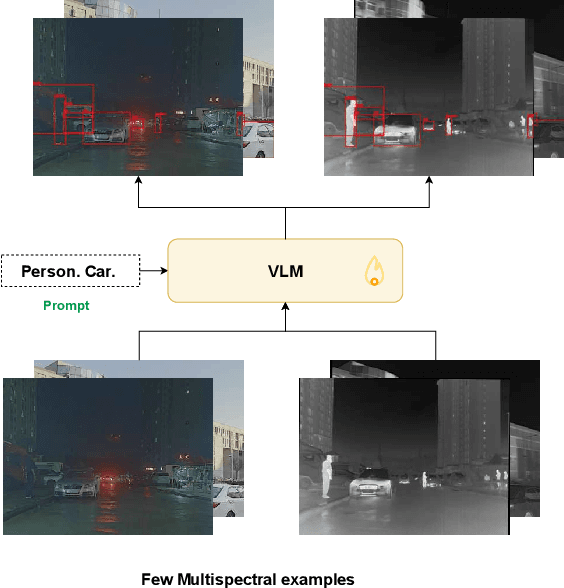
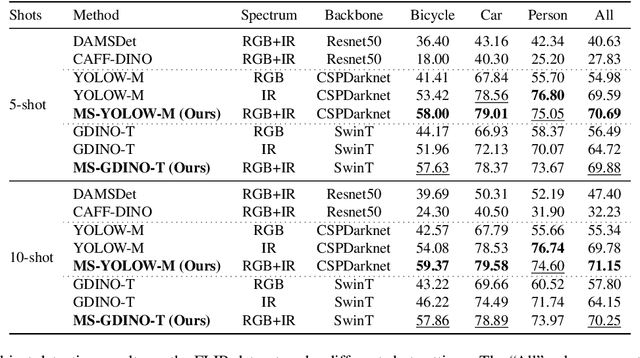
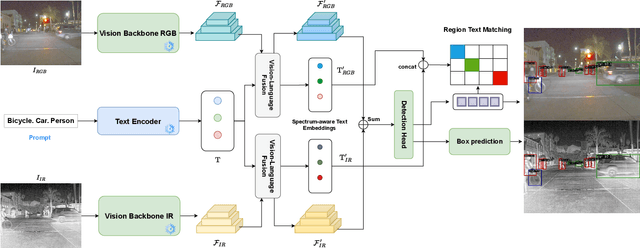
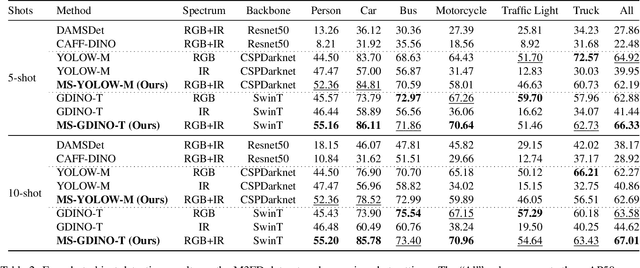
Abstract:Multispectral object detection is critical for safety-sensitive applications such as autonomous driving and surveillance, where robust perception under diverse illumination conditions is essential. However, the limited availability of annotated multispectral data severely restricts the training of deep detectors. In such data-scarce scenarios, textual class information can serve as a valuable source of semantic supervision. Motivated by the recent success of Vision-Language Models (VLMs) in computer vision, we explore their potential for few-shot multispectral object detection. Specifically, we adapt two representative VLM-based detectors, Grounding DINO and YOLO-World, to handle multispectral inputs and propose an effective mechanism to integrate text, visual and thermal modalities. Through extensive experiments on two popular multispectral image benchmarks, FLIR and M3FD, we demonstrate that VLM-based detectors not only excel in few-shot regimes, significantly outperforming specialized multispectral models trained with comparable data, but also achieve competitive or superior results under fully supervised settings. Our findings reveal that the semantic priors learned by large-scale VLMs effectively transfer to unseen spectral modalities, ofFering a powerful pathway toward data-efficient multispectral perception.
LCE: An Augmented Combination of Bagging and Boosting in Python
Aug 15, 2023
Abstract:lcensemble is a high-performing, scalable and user-friendly Python package for the general tasks of classification and regression. The package implements Local Cascade Ensemble (LCE), a machine learning method that further enhances the prediction performance of the current state-of-the-art methods Random Forest and XGBoost. LCE combines their strengths and adopts a complementary diversification approach to obtain a better generalizing predictor. The package is compatible with scikit-learn, therefore it can interact with scikit-learn pipelines and model selection tools. It is distributed under the Apache 2.0 license, and its source code is available at https://github.com/LocalCascadeEnsemble/LCE.
XCM: An Explainable Convolutional Neural Network for Multivariate Time Series Classification
Sep 10, 2020



Abstract:We present XCM, an eXplainable Convolutional neural network for Multivariate time series classification. XCM is a new compact convolutional neural network which extracts, in parallel, information relative to the observed variables and time from the input data. Thus, XCM architecture enables faithful explainability based on a post-hoc model-specific method (Gradient-weighted Class Activation Mapping), which identifies the observed variables and timestamps of the input data that are important for predictions. Our evaluation firstly shows that XCM outperforms the state-of-the-art multivariate time series classifiers on both the large and small public UEA datasets. Furthermore, following the illustration of the performance and explainability of XCM on a synthetic dataset, we present how XCM can outperform the current most accurate state-of-the-art algorithm on a real-world application while enhancing explainability by providing faithful and more informative explanations.
A Performance-Explainability Framework to Benchmark Machine Learning Methods: Application to Multivariate Time Series Classifiers
May 29, 2020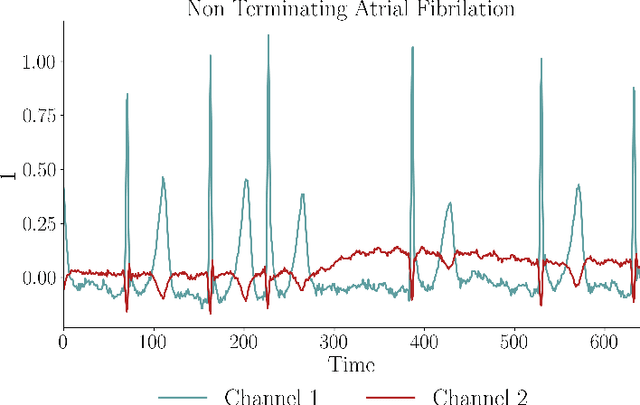

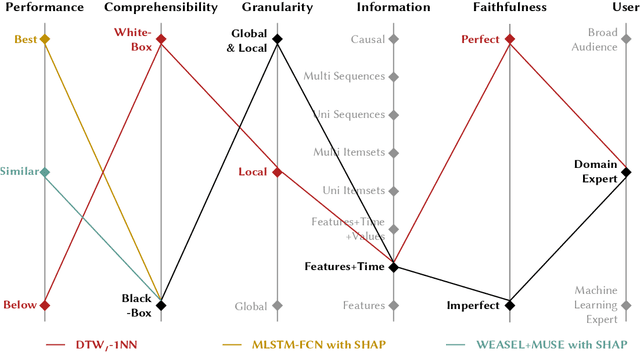
Abstract:Our research aims to propose a new performance-explainability analytical framework to assess and benchmark machine learning methods. The framework details a set of characteristics that operationalize the performance-explainability assessment of existing machine learning methods. In order to illustrate the use of the framework, we apply it to benchmark the current state-of-the-art multivariate time series classifiers.
Local Cascade Ensemble for Multivariate Data Classification
May 07, 2020
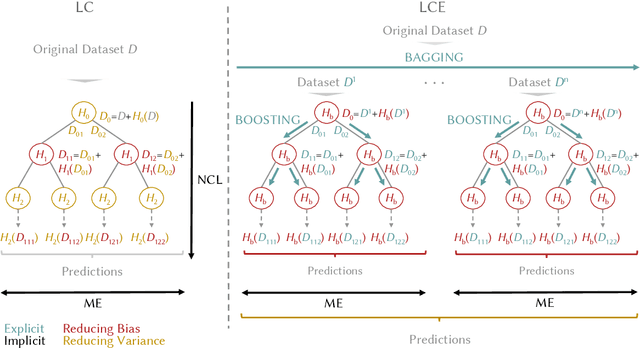
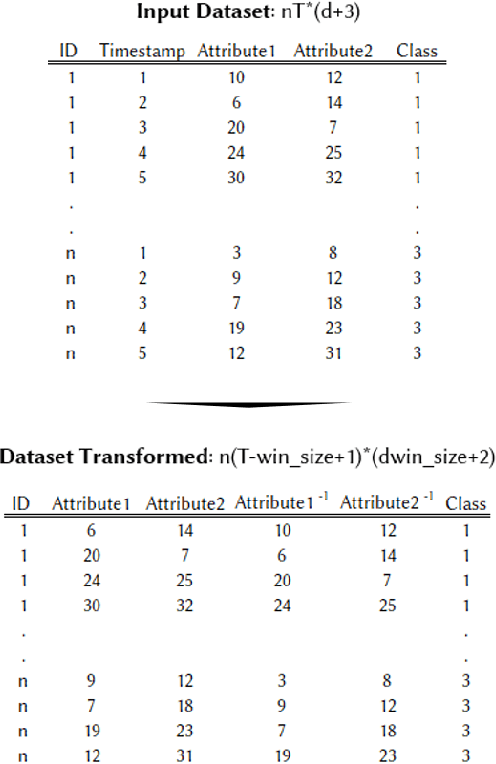
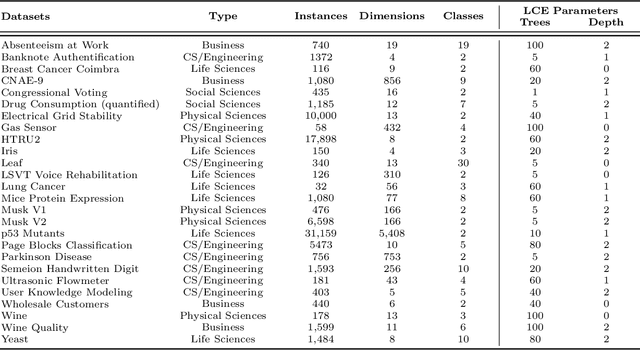
Abstract:We present LCE, a Local Cascade Ensemble for traditional (tabular) multivariate data classification, and its extension LCEM for Multivariate Time Series (MTS) classification. LCE is a new hybrid ensemble method that combines an explicit boosting-bagging approach to handle the usual bias-variance tradeoff faced by machine learning models and an implicit divide-and-conquer approach to individualize classifier errors on different parts of the training data. Our evaluation firstly shows that the hybrid ensemble method LCE outperforms the state-of-the-art classifiers on the UCI datasets and that LCEM outperforms the state-of-the-art MTS classifiers on the UEA datasets. Furthermore, LCEM provides explainability by design and manifests robust performance when faced with challenges arising from continuous data collection (different MTS length, missing data and noise).
 Add to Chrome
Add to Chrome Add to Firefox
Add to Firefox Add to Edge
Add to Edge